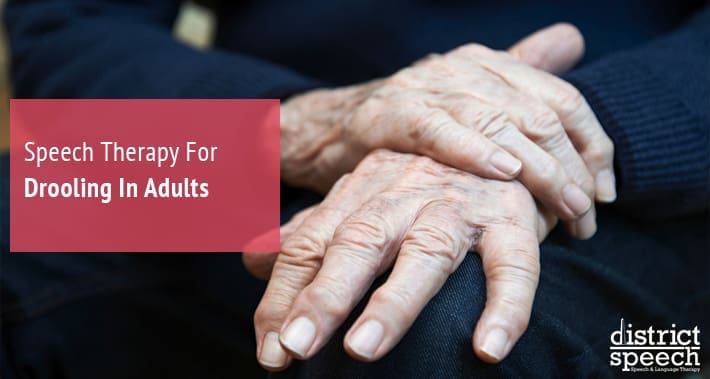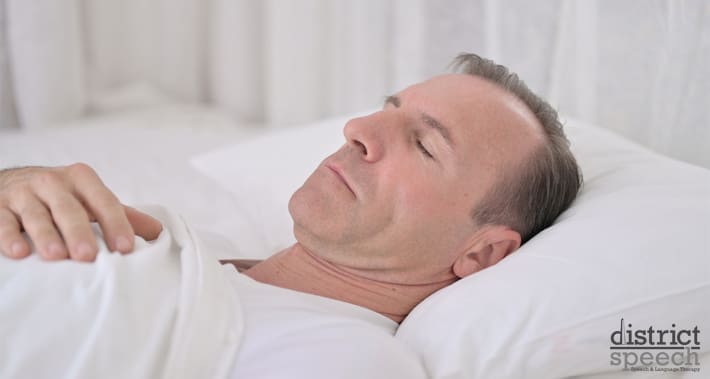
Drooling – it might be embarrassing, but most of us do it occasionally.
For example, have you ever woken up next to a puddle of drool on your pillow?
Since swallowing occurs less frequently when you sleep, occasional nighttime drooling is common amongst adults.
However, excessive and frequent drooling in adults may lead to a variety of problems, such as:
- Lip chapping
- Skin irritation
- Skin breakdown
- Psychosocial impacts, such as bullying and low self esteem
If you’ve been experiencing excessive drooling, speech therapy for adults can help.
Let’s find out how.
What Is Drooling In Adults?
Drooling is very common during infancy and early childhood.
This is because babies don’t have full control over their swallowing muscles.
There are certain conditions that may suggest your baby’s drooling is an issue, like:
However, in most cases, it’s just a reality of being a baby, and pediatric speech therapy is unnecessary.
Once fully developed, however, your muscles and oral structures control saliva secretions by making constant, subtle adjustments.
Therefore, drooling in adults may signify problems with sensory awareness with the muscles of your lips, cheeks, jaw, tongue, or soft palate.
What Causes Drooling In Adults?
Drooling in adults can be caused by numerous factors, such as:
- Certain infections, such as upper respiratory infections, sinus infections, and middle ear infections
- Neurological conditions affecting the nerves and muscles that control swallowing, such as cerebral palsy
- Certain autoimmune disorders, such as myasthenia gravis and Guillain-Barré syndrome
- Traumatic brain injury
- A stroke
- Parkinson’s disease
- Weakness on one side of the face (Bell’s palsy)
- Amyotrophic lateral sclerosis (ALS)
- Certain medications
- Gastroesophageal influx (acid reflux)
- Mouth breathing
- Body positioning
How Can Speech Therapy For Drooling In Adults Help?
The primary goals of speech therapy for drooling in adults are improvement of jaw stability, tongue strength, and mobility of lips.
The best speech therapy method will depend on the specific cause of your drooling.
Your speech therapist can conduct an evaluation to determine the baseline of your muscle function in your lips, cheeks, jaw, tongue, and soft palate.
During this process, numerous muscle functions will be evaluated, such as:
- Response to pressure and movement
- Range of movement
- Variety of movement
- Strength of movement
- Control of movement
Once the cause of your drooling is determined, your speech therapist may use one of the following therapeutic strategies:
1. Oral Facial Facilitation
Oral facial facilitation is a speech therapy method used to improve oral motor control, sensory awareness, and frequency of swallowing.
Oral facial facilitation includes a variety of techniques aimed at improving muscle tone and saliva control.
Examples of oral facial facilitation techniques include:
- Applying ice to improve tone and swallow reflex
- Brushing teeth before meals
- Using vibrations to improve muscle tone
- Manipulation of muscles, such as tapping, stroking, or patting with fingertips to improve oral awareness
- Oral motor sensory exercises, such as lip and tongue exercises
2. Developing Eating And Drinking Skills
Drooling can be made worse by poor eating and drinking skills.
Your speech therapist can work with you to practice eating and drinking skills aimed at reducing instances of drooling.
Your speech therapist can work with you to help develop better eating and drinking techniques surrounding lip closure, tongue movement, and swallowing.
Additionally, your speech therapist may advise you against eating and drinking certain foods which increase saliva production such as alcohol and acidic fruits.

3. Positioning Improvements
Changing your body positioning can significantly improve instances of drooling in adults.
Your speech therapist will work with you to practice good posture and proper trunk and head control, as these skills provide the basis for improving oral control and drooling.
Additionally, your speech therapist may recommend specific sleeping positions to improve nighttime drooling.
For instance, switching to sleeping on your back can help stop excessive drooling.
A wedge pillow can help keep you in this position while you sleep.
4. Behavioral Modification
Behavioral modification uses cueing, overcorrection, and positive and negative reinforcement to help drooling in adults.
During behavioral modification therapy, behaviors such as swallowing and mouth wiping are encouraged.
Simultaneously, behaviors such as keeping your mouth open and thumb sucking are discouraged.
Behavioral modification can help improve drooling in several ways, including:
- Increased awareness of your mouth and it’s functions
- Increased frequency of swallowing
- Increased swallowing skills
Behavioral modification is also particularly useful as it can be practiced at home with family and friends and carries no negative side effects.
5. Other Treatments
Speech therapy offers several other treatments aimed at reducing drooling in adults.
For best results, you should begin speech therapy as soon as possible.
Speech therapy techniques used for drooling in adults have several benefits, including
- Improvement of jaw stability and closure
- Improvement of tongue mobility, strength, and positioning
- Improvement of lip closure
- Decreased nasal regurgitation during swallowing
Book Your Appointment With District Speech
At District Speech, we know how embarrassing excessive drooling can be.
Our professional team of speech pathologists want to help you reduce your drooling to help improve your quality of life.
Book an appointment with District Speech today.
1300 I St NW, Suite 400 E,
Washington, DC 20005
- https://g.page/districtspeech
District Speech and Language Therapy specializes in speech therapy, physical therapy, and occupational therapy solutions, for both children and adults, in the Washington D.C and the Arlington Virginia areas.